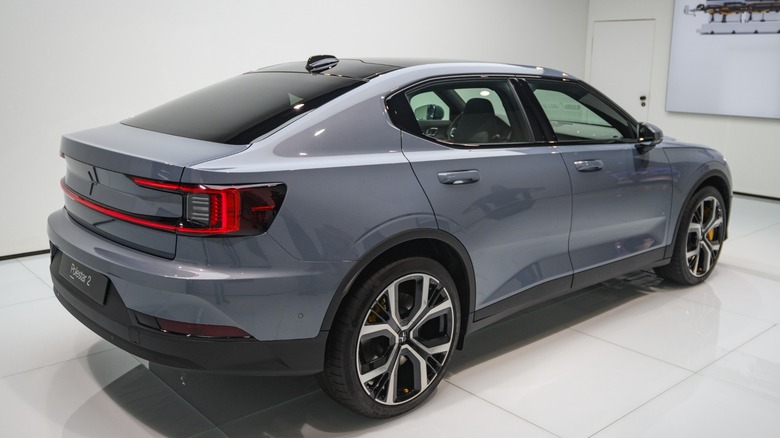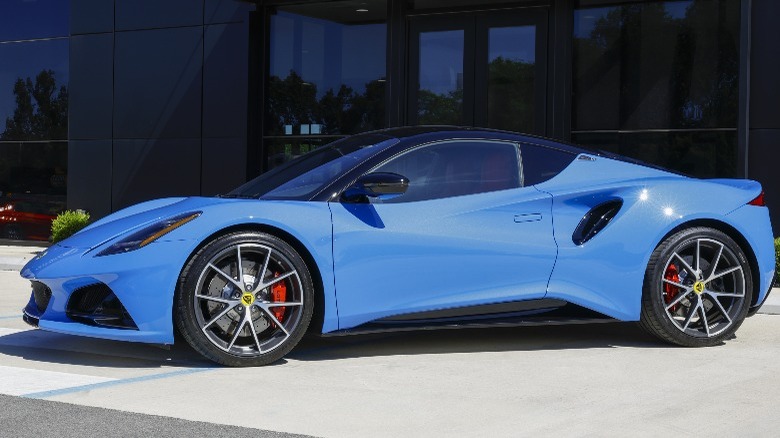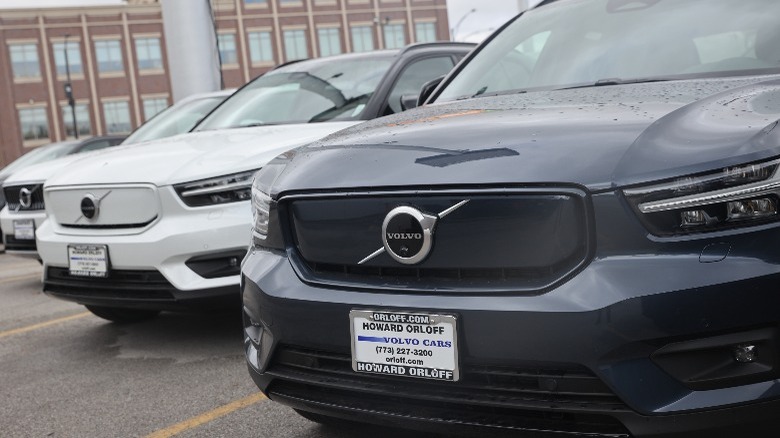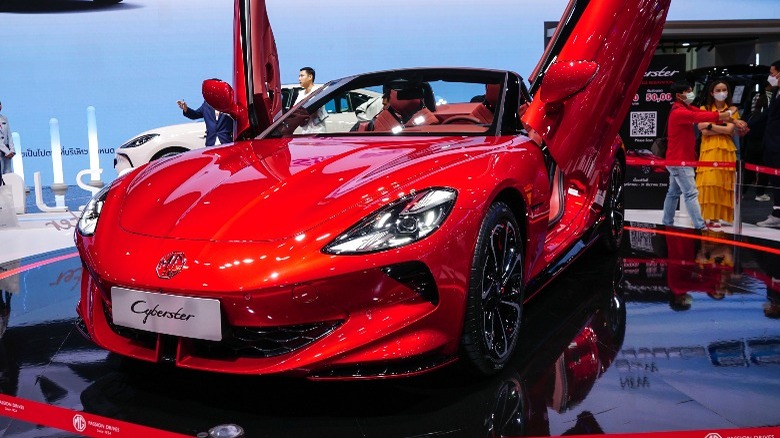Four Car Brands You'll Be Surprised To Know Come From China
Car enthusiasts in the United States are no stranger to automotive conglomerates owning some of their favorite car brands. General Motors' portfolio of famous makers has been enormous for more than three-quarters of a century. After four brands were eliminated during its restructuring in 2010, it is down to 'just' Buick, Cadillac, Chevrolet, and GMC. Mopar fans will recognize Stellantis' American nameplates in Chrysler, Dodge, Jeep and Ram. Even those who subscribe to the phrase "found on the road dead" will know Ford also owns the luxury brand Lincoln. The same can be said of quite a few different large international corporate groups, including entities whose ownership are located in countries like Germany, India, and China.
What might surprise those same enthusiasts is the current ownership of some of the world's most storied international automotive brands. Jaguar and Land Rover have been a part of Indian manufacturer Tata Motors since 2008. Lamborghini became a part of the behemoth that is Volkswagen Group alongside fellow luxury-car manufacturers Bentley and Bugatti in 1998. But which of the marques, so familiar on American roads, are now owned by Chinese corporations?
Lotus is owned by Geely
Founded by engineer Colin Chapman in 1952, Lotus introduced its first vehicle for public consumption, the Mark VII (or Lotus 7), in 1957. Lotus continued to operate as an independent company producing exciting sports cars for an audience that valued its lightweight approach to vehicle design until it was purchased by General Motors in 1986. General Motors would eventually sell the company to Italian businessman Romano Artioli in 1993, who would offload it to Malaysian carmaker Proton in 1996.
During its ownership under Artioli and Proton, Lotus developed a new modular platform architecture composed of glued aluminum sections that would underpin their vehicles for the next decade and beyond, beginning with the mid-engined Elise. The Elise would eventually make it to American shores with its second-generation, when Lotus equipped it with a Toyota-sourced four cylinder that was compliant with Federal Government emissions requirements.
In June of 2017, Chinese automaker Geely purchased a controlling fifty-one percent stake in Lotus from Proton. Under Geely, Lotus has dramatically expanded its product portfolio beyond sports cars like the Emira to include the Eletre, a high performance electric SUV, and the Evija, an all-electric supercar. Also in the product pipeline for a 2024 debut is an electric grand tourer dubbed the Emeya. While the only convention seemingly remaining from earlier days of Lotus seems to be badges starting with 'E', these new models portend a brighter future for a brand that in decades past struggled to stay in business.
Volvo and Polestar are Geely-owned automakers
The first Volvo vehicle introduced to the United States automotive market was the PV444, and was its best selling model throughout the 1960s. Their 240 series, first produced in 1975 as a sedan and wagon, featured safety innovations like crumple zones and collapsible steering columns, and solidified Volvo's reputation as a go-to for buyers who valued safety as a priority in their vehicle purchase.
The 1990s brought racing ambitions to Volvo, where factory-owned teams fielded race-prepped 850 wagons in the British Touring Car Championship series. Around that same time, Volvo-driving Swedish racing team Flash Engineering was founded – to be eventually purchased by Volvo in 2005 and re-christened Polestar as the brand's in-house analog to competitor BMW's M division.
Volvo Car's independence came to an end in 1999, when it was purchased by automotive giant Ford Motor Company. Ford would integrate Volvo into its Premier Automotive Group along with sister brands Aston Martin, Land Rover, Jaguar, and Lincoln. The global economic crisis that began in 2008 forced Ford to liquidate many of its assets, including the sale of Volvo to Chinese automaker Geely in 2010. Since that transaction, Volvo has diversified its lineup to include a range of SUVs with a fully electric option – while Polestar, now a separate company, solely produces EVs like the Polestar 3 that cater to those seeking Scandinavian design but more athletic driving dynamics offered by their Volvo brethren.
MG is owned by SAIC Motor
MG Car Company was officially founded in 1928 in the United Kingdom, and before the Second World War forced a halt to production in 1939, the little company had sold over 18,000 vehicles. The 1940s brought both sadness in the unfortunate death of its founder, Cecil Kimber, as well as opportunity with the first sales of MG in the U.S. As distribution of the little ragtops grew across the country, America's love affair with the sports car was officially underway.
Through the 1950s and 1960s, sales of MG vehicles continued to climb. As part of British Leyland, total assembly of MG-badged vehicles passed the one-million mark in 1975. Sales would wax and wane through the 1980s and 1990s, and in 1994 the Rover group (of which MG was a part) was purchased by BMW – who would offload the struggling automaker to the Phoenix consortium in the year 2000. The brand would again change hands like a baton in a relay race, this time to Chinese manufacturer Nanjing Automotive Company, which would then be acquired by a second Chinese company, SAIC Motor.
Under the umbrella of SAIC Motor, MG faced the enormous task of re-establishing itself after more than a decade of absence. It did so initially with the MG6 sedan and the MG3 hatchback, and today has a lineup consisting of both hybrid-electric and full electric vehicles – and the promise of a new electric roadster, the awkwardly named but attractively styled Cyberster, expected to debut sometime in 2024.



